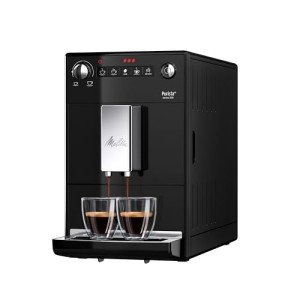Home Use Espresso Machines : A Comprehensive Guide
Espresso machines have actually become a staple in lots of homes as coffee enthusiasts seek to replicate café-quality brews in the comfort of their cooking areas. The increase in appeal has resulted in a varied market filled with different models, features, and rates. This post aims to offer a helpful introduction of home use espresso machines, assisting readers browse their alternatives efficiently.
Understanding Espresso Machines
Espresso machines work by forcing hot water through finely-ground coffee under high pressure, resulting in a focused coffee drink referred to as espresso. There are a number of types of espresso machines classified based on their developing approaches and level of automation. The most typical types consist of:
- Manual Espresso Machines: These require the user to control the pressure and water circulation, permitting a more hands-on coffee-making experience.
- Semi-Automatic Espresso Machines: These offer automatic control over water pressure, while the user by hand grinds and tamps the coffee.
- Automatic Espresso Machines: With the push of a button, these machines instantly manage the flow of water, making it simpler to brew espresso with constant results.
- Super-Automatic Espresso Machines: These all-in-one machines handle grinding, tampering, brewing, and even milk frothing, making them ideal for users looking for convenience.
- Pill or Pod Machines: These use pre-packaged coffee pods to produce espresso with very little effort, however they restrict option in brewing techniques and tastes.
Table: Comparison of Espresso Machine Types
| Type | Control Level | Ease of Use | Cleaning Level | Perfect For |
|---|---|---|---|---|
| Manual | User-controlled | Moderate | High | Coffee perfectionists |
| Semi-Automatic | Partial automation | Moderate | Moderate | Home baristas |
| Automatic | Totally automated | Easy | Low | Hectic individuals |
| Super-Automatic | Totally automated | Really simple | Really low | Convenience candidates |
| Capsule/Pod | Completely automated | Very easy | Very low | Casual drinkers |
Secret Features to Consider
When selecting a home use espresso machine, it's essential to think about various features that can significantly impact the quality of espresso and user experience.
- Pressure: Look for machines that provide a minimum of 9 bars of pressure, as this is considered optimal for brewing espresso.
- Boiler Systems: Single vs. dual boiler systems figure out temperature level stability and the capability to brew espresso and steam milk all at once.
- Grinder: Integrated mills enable freshly ground coffee, which enhances taste. Think about machines with adjustable grind settings.
- Milk Frother: For those who enjoy cappuccinos and lattes, a built-in steam wand or automatic frother is crucial.
- Size and Design: Consider your kitchen area area and visual choices. Machines can be found in various sizes, from compact to large setups.
- Rate: Home espresso machines can vary from a few hundred to a number of thousand dollars, so it's crucial to develop a budget before exploring options.
Advantages and disadvantages of Home Use Espresso Machines
| Pros | Cons |
|---|---|
| Convenience of brewing coffee in the house | Initial investment can be high |
| Quality of espresso is often superior | Requires some skill, especially with manual machines |
| Capability to experiment with flavors | Upkeep and cleansing can be labor-intensive |
| Can save cash in the long run | Not all machines will suit every coffee choice |
Maintenance and Cleaning Tips
Preserving an espresso machine is vital for extending its life and guaranteeing consistent brew quality. Here are some helpful ideas:
- Regular Descaling: Minerals from water can develop in the machine. Descale every 1-3 months, depending upon water hardness.
- Daily Cleaning: Rinse portafilters, baskets, and steam wands after each use to avoid coffee oils from building residue.
- Use Filtered Water: This can assist lower mineral buildup and enhance the taste of coffee.
- Replace Gaskets and Seals: These components may break over time and needs to be changed to keep pressure and performance.
- Read the Manual: Each machine has specific care directions; following these will guarantee durability.
FAQs About Home Use Espresso Machines
Q1: What is the best budget espresso machine?The best budget espresso machine often depends on individual requirements, however designs like the DeLonghi EC155 or the Breville Bambino are popular among users for offering fantastic worth. Q2: How long do home espresso machines normally last?With correct maintenance, home espresso machines can last anywhere from 5 to 15 years, depending upon the quality of the machine and frequency of use. Q3: Can I make cappuccinos and lattes with any espresso machine?While most espresso machines can make cappuccinos and lattes, having a dependable
steam wand or frother is necessary for achieving the best milk texture.
Q4: Are super-automatic machines worth the investment?For those who prioritize benefit and fast brewing, super-automatic machines can be worth the financial investment, though they may lack some customizability in brew strength and flavor. Q5: What types of coffee beans are best for espresso?While personal choice plays a function, beans identified as" espresso "blends are usually roasted darker, creating rich tastes and a creamy texture when brewed.
Buying a home espresso machine can transform the daily coffee routine into something special, raising home brews to café quality. By comprehending the various types of machines, crucial functions to consider, maintenance requirements, and weighing the
benefits and drawbacks, consumers can make educated decisions that match their specific choices. As the espresso culture continues to grow, no matter the choice, every brew can be a tasty experience waiting to be relished.

